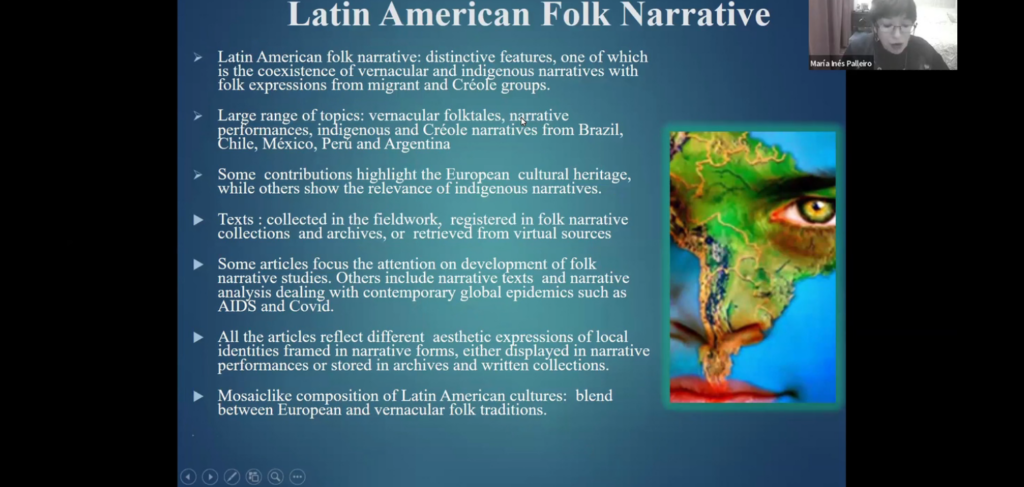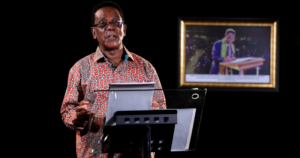
María Inés Palleiro et al.’s presentation titled “Trends and Topics of Latin American Folk Narrative during the last two centuries: tradition and social changes” can now be viewed here:
https://isfnr.org/isfnr-online-lectures/previous-lecturlmes/
The aim of this lecture is to offer a polyphonic panorama of Latin American folk narrative, through the voices of different researchers from Chile, Perú, Brazil, México and Argentina, connected with an overview of Latin American folk narrative studies in the last two centuries. This panorama comprises an overview of paradigms, collections, studies and Folk narrative archives in Argentina and Chile; an approach to Latin American indigenous narratives from México, Peruvian Amazonia, Northeastern and Southern Brazil and Northeastern Argentina, as well a study of narratives and performances of migrant groups such as Jewish and Slovenians collected in Argentina. Some contributions highlight the European cultural heritage, while others show the relevance of indigenous narratives. Folk narrative expressions here addressed were both collected in the fieldwork, registered in folk narrative collections and archives, or retrieved from virtual sources. Some contributions focus the attention on development of folk narrative studies, offering overview of the different trends and topics of folk narrative research in Latin America. Others include narrative texts and narrative analysis dealing with contemporary global epidemics such as AIDS and Covid. All of them reflect different verbal aesthetic expressions of local identities framed in narrative forms, either displayed in narrative performances or stored in archives and written collections.
In the first part of this lecture, “Paradigms in Folk Narrative Studies, Collections, Archives”, I will deal with “Argentinian Folktales in the Latin American Context: Collections and Belief Narratives”, while Ana Dupey will focus her short dissertation in “Folklore Disciplinary Narratives Produced by Scholarly Community in Argentina. Social Dimension in Focus” and Cristian Yáñez Aguilar, who sent an abstract of his work, will focus the attention in “Traditional Culture and Folklore Science: Two Approaches in the Discursive Construction of the Cultural Field of Folklore in Chile”. In the second part, regarding “Indigenous narratives”, Daniel Díaz Benavides will speak about “Folkloric Narratives of the Peruvian Amazon”, and Mercedes Zavala Gómez del Campo will deal with “How to Study Folktales and Legends From Oral Indigenous Heritage of México”. Luciana Hartmann and Renata de Lima Silva, from Brazil, sent an abstract of their research about “Between Borders and Crossroads: the Performance of Orality in Different Brazilian Bodies and Contexts”, while Alejandra Vidal and Sabrina Maciel sent as well a summary of their work dealing with “Narratives of Pilagá Native Societies in the Argentinian Context”. In the last part of this lecture, dealing with “ Migration narratives”, Fernando Fischman will speak about “Jewish Traditions in a Latin American Background. Enacting an Intercultural Diaspora in the Context of Argentine Identity Politics” and Barbara Ivančič Kutin, about “Elements of Latin American Culture in the (Folk) Narratives of Slovenes in Argentina”
The goal of drawing a multicultural map of Latin American communities through folk narrative expressions, whose distinctive feature is the coexistence of vernacular and indigenous narratives with narrative folk expressions from migrant and Créole groups, will be be reached thanks to the collaboration of Latin American colleagues, with some of which I have the pleasure of sharing this lecture. Since others cannot be present, I will offer a short abstract of their research work and their research interests. All the contributions show the richness and complexity of Latin American folk narrative.


